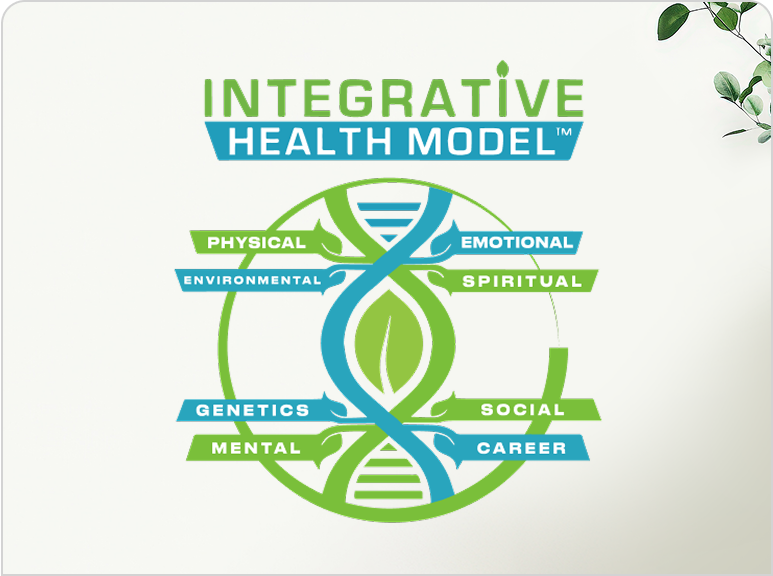3 Tips to Improve Your Mental Health

If feelings of depression or anxiety hold you back from enjoying your life, Dr. Doug Cutler and his team of naturopathic providers can help. Dr. Cutler will explore the root causes of your mental health concerns and develop a comprehensive plan to help you feel better physically and mentally. Improving your mental health goes hand in hand with balancing your physical and emotional health.
How Does Naturopathic Medicine View Mental Health?
Traditional medicine tends to view mental health as a disease, and they treat it with medications to manage the symptoms. Naturopathic medicine sees mental health issues as a symptom of a larger systemic imbalance. Instead of masking your symptoms, they work to restore the balance between mind and body,
What Causes Mental Health Concerns?
We experience many stressors throughout our everyday lives. The constant stress leads to a cascade of hormones that keep our bodies and minds in a permanent state of high alert. This affects sleep, metabolism, and physical health. It can also lead to depression and anxiety. Many types of physical imbalances can lead to symptoms of depression or anxiety. These conditions respond well to lifestyle adjustments and natural supplement support.
The Importance of Social Connections and Support Systems
The Role of Social Connections in Mental Health
Social connections are not just beneficial—they are essential for mental well-being. Studies show that individuals with strong social relationships have a 50% higher chance of living longer compared to those who are isolated (Holt-Lunstad, 2010). This powerful effect is linked to the way social bonds help reduce stress, boost mood, and provide a sense of purpose.
The Hidden Benefits of Staying Connected
Spending time with loved ones or participating in group activities does more than just lift your spirits. It actually helps regulate your body’s stress hormones, such as cortisol, which, when left unchecked, can contribute to mental health disorders like anxiety and depression. Regular interaction with others fosters a sense of security, helping you feel supported even during challenging times.
Building Meaningful Relationships
Quality matters more than quantity when it comes to social ties. A few close, supportive friends can have a more profound impact on your mental health than having a large circle of acquaintances. Try to focus on cultivating deeper connections by actively listening and being present during conversations.
Practical Steps to Strengthen Your Social Network
- Reconnect with Old Friends: Send a message or make a call to someone you haven’t spoken to in a while. A small gesture can reignite meaningful conversations.
- Join Community Groups or Clubs: Look for local groups or online communities centered around hobbies you enjoy. This is a great way to meet new people and find common ground.
- Get Involved in Volunteering: Volunteering not only connects you with others but also enhances your mood and sense of fulfillment by contributing to a greater cause.
Seeking Social Support During Tough Times
When facing adversity, don’t hesitate to lean on your network for support. Even a brief conversation with a trusted friend can help clarify your thoughts and provide emotional relief. Peer support groups, whether online or in person, offer a safe space to share experiences and learn coping strategies from others.
Integrating these tips into your routine can significantly strengthen your support system, improving your mental health and overall quality of life.

Tips to Improve Your Mental Health
Naturopathic medicine does not offer a pill to numb all your anxiety or depression within a week. It utilizes methods that you can maintain for life, so your mental health symptoms remain under control while your physical health improves. These tips can help improve your mental health and restore your natural balance.
1. Detoxify
Our bodies experience a barrage of potentially harmful environmental stressors each day. Toxic materials can accumulate in the body and cause physical and mental health issues. Most of us have regular exposure to neurotoxic chemicals that can cause mental health problems. Detoxification rids the body of these toxins and their effects.
2. Manage Your Physical Health
While not as easy as a pill, nutritional management and physical activity have a much more positive effect on your mental health. With a nutritional plan tailored to meet your needs and any possible deficiencies, your brain will have the fuel it needs to function better. Physical activity produces hormones that boost mental health and feelings of well-being.
3. Reduce Stress
The hormones triggered by chronic stress can wreak havoc throughout your body. They also contribute to anxiety and depression. The effects of stress hormones keep your body constantly prepared to fight or flee, a state that leaves you exhausted and feeling even more stressed. By identifying and removing stressors in your life, you can significantly improve your mental health.
The Role of Sleep and Physical Activity in Mental Health
How Sleep Affects Mental Health
Sleep isn’t just a time for rest—it’s when the brain processes emotions, consolidates memories, and repairs itself. Lack of sleep has been shown to increase the risk of mental health issues like anxiety and depression by up to 40% (Harvard Medical School, 2019). Poor sleep disrupts the balance of hormones such as serotonin and dopamine, which are crucial for mood regulation.
Establishing a Healthy Sleep Routine
To maintain good mental health, it’s essential to prioritize sleep. Establish a consistent bedtime routine to signal your body that it’s time to wind down. Try creating a relaxing pre-sleep ritual, such as reading a book, practicing deep breathing, or limiting screen time at least an hour before bed. Even small changes, like keeping your room dark and quiet, can significantly improve sleep quality.
Exercise: A Natural Mood Booster
Physical activity is a powerful tool for enhancing mental health. Regular exercise triggers the release of endorphins—chemicals in the brain that act as natural mood lifters. A study by the American Psychological Association found that just 30 minutes of exercise a few times a week can reduce symptoms of depression by 30%. It also helps regulate sleep patterns and reduces stress.
Choosing the Right Type of Exercise
Not every form of exercise suits everyone, so it’s important to find what works for you. Low-impact activities such as walking, yoga, or swimming are great for beginners and can be easily integrated into daily routines. High-intensity exercises, like running or strength training, provide more intense mood-boosting benefits for those who are physically able and looking for a challenge.
Incorporating Movement into Daily Life
- Take Short Walks: Break up your day with 10-15 minute walks. This can help clear your mind and reduce mental fatigue.
- Try Gentle Stretches or Yoga: These activities are not only good for flexibility but also calm the mind, making them ideal for stress management.
- Join a Fitness Class or Group Activity: Exercising in a group can provide social support and motivation, turning a solitary activity into a social experience.
Creating a Sustainable Routine
The key to making sleep and physical activity work for your mental health is consistency. Start small, set achievable goals, and gradually increase intensity as you progress. Tracking your progress can keep you motivated and help you see the tangible benefits these habits bring to your mental and physical health.
How are Mental Health Concerns Treated?
Dr. Cutler will begin with a thorough consultation and a series of tests. One type of test can see how your brain chemical levels are impacting your mental health. Dr. Cutler can then supplement those chemicals so you start feeling better naturally. Other tests will determine whether you have dietary imbalances, a burden of toxins, or other issues. Dr. Cutler creates an individualized nutrition plan for each patient. He also acts as a guide in helping people discover physical activities they enjoy and ways to reduce stress from their lives.
How to Improve Mental Health of Students
Understanding the Unique Mental Health Challenges Students Face
Students often juggle multiple responsibilities—academics, extracurricular activities, and social engagements—all while navigating major life transitions. This combination can lead to overwhelming stress, anxiety, or even depression. In fact, according to the American College Health Association, nearly 60% of college students reported feeling overwhelming anxiety in the past year. Addressing mental health in students requires a proactive approach that includes building resilience, promoting healthy habits, and creating supportive environments.
1. Building Resilience Through Time Management and Stress Reduction
Effective time management is key for students to maintain a balance between academic responsibilities and personal life. Encourage students to create a structured schedule that includes dedicated study periods, breaks, and leisure activities. This helps reduce last-minute cramming, which is a significant source of stress.
- Create a Realistic Schedule: Use planners or digital apps to break down tasks into manageable chunks and set clear goals for each day.
- Prioritize Tasks: Teach students to identify urgent tasks and focus on completing them before moving on to less critical activities.
- Incorporate Breaks: Taking short, regular breaks during study sessions can prevent burnout and help retain information more effectively.
2. Promoting Physical Health for Mental Wellbeing
Physical health is directly linked to cognitive function and emotional stability. Encourage students to engage in regular physical activities, such as jogging, sports, or yoga, to manage stress and boost energy levels.
- Participate in Campus Fitness Programs: Many schools offer fitness classes and sports facilities. Suggest these options to students looking to incorporate exercise into their routines.
- Practice Good Nutrition: A balanced diet with adequate vitamins and minerals can improve concentration and mood. Encourage students to avoid excessive caffeine or junk food, which can negatively impact energy and focus.
3. Fostering Social Connections and Peer Support
For students, a sense of belonging is crucial for mental wellbeing. Isolation or lack of social interaction can increase the risk of developing anxiety or depression. Being part of a supportive community provides emotional reassurance and practical advice during challenging times.
- Join Study Groups or Clubs: Study groups not only enhance learning but also offer social support. Clubs and organizations are great places to meet new people and build friendships.
- Engage in Peer Support Networks: Many schools have peer support programs where students can share experiences and coping strategies. This creates a safe space for discussing challenges and seeking help.
4. Encouraging Mindfulness and Relaxation Techniques
Mindfulness techniques, such as meditation and deep breathing exercises, can help students stay focused and calm amid academic pressure. These practices train the brain to focus on the present moment, reducing anxiety about future exams or assignments.
- Use Meditation Apps: Recommend apps like Headspace or Calm that guide students through meditation and mindfulness exercises tailored for beginners.
- Incorporate Relaxation Activities: Activities like coloring, listening to music, or engaging in hobbies provide mental relaxation and help manage stress.
5. Knowing When to Seek Professional Help
Despite best efforts, some students may struggle with persistent anxiety, depression, or other mental health issues that require professional intervention. Educational institutions often have counseling centers or mental health services available. Encourage students to utilize these resources when self-help methods are not enough.
- Recognize Warning Signs: Changes in behavior, prolonged sadness, or withdrawal from social interactions are potential signs that a student may need professional support.
- Access Campus Counseling Services: Make students aware of on-campus counseling centers and emergency helplines they can contact in times of need.
By integrating these strategies, students can better manage their mental health, leading to improved academic performance, enhanced social relationships, and a more fulfilling student experience.
Take the Next Step
Schedule a consultation with Dr. Doug Cutler and his team of expert naturopathic providers to learn more about mental health. Call us at (248) 663-0165 today! Cutler Integrative Medicine is dedicated to your health and well-being.
Cutler Integrative Medicine is a premier award-winning wellness clinic that provides patients with unparalleled individualized naturopathic healthcare. Dr. Doug Cutler is a nationally renowned expert in Naturopathic medicine and has the highest training in his field, as well as in Environmental Medicine, IV Nutrient Therapy, and Detoxification. His ClubIV™ is one of the most extensive IV Nutrient Clinics in the country.
You May Also Like




.png)

.png)



%201.png)



.png)

.png)



.png)
.png)
.png)
.png)
.png)
.png)
.png)
.png)

.png)
.png)
.png)
.png)

.png)
.png)

.png)
.png)






.png)




.png)
.png)
.png)

.png)

.png)